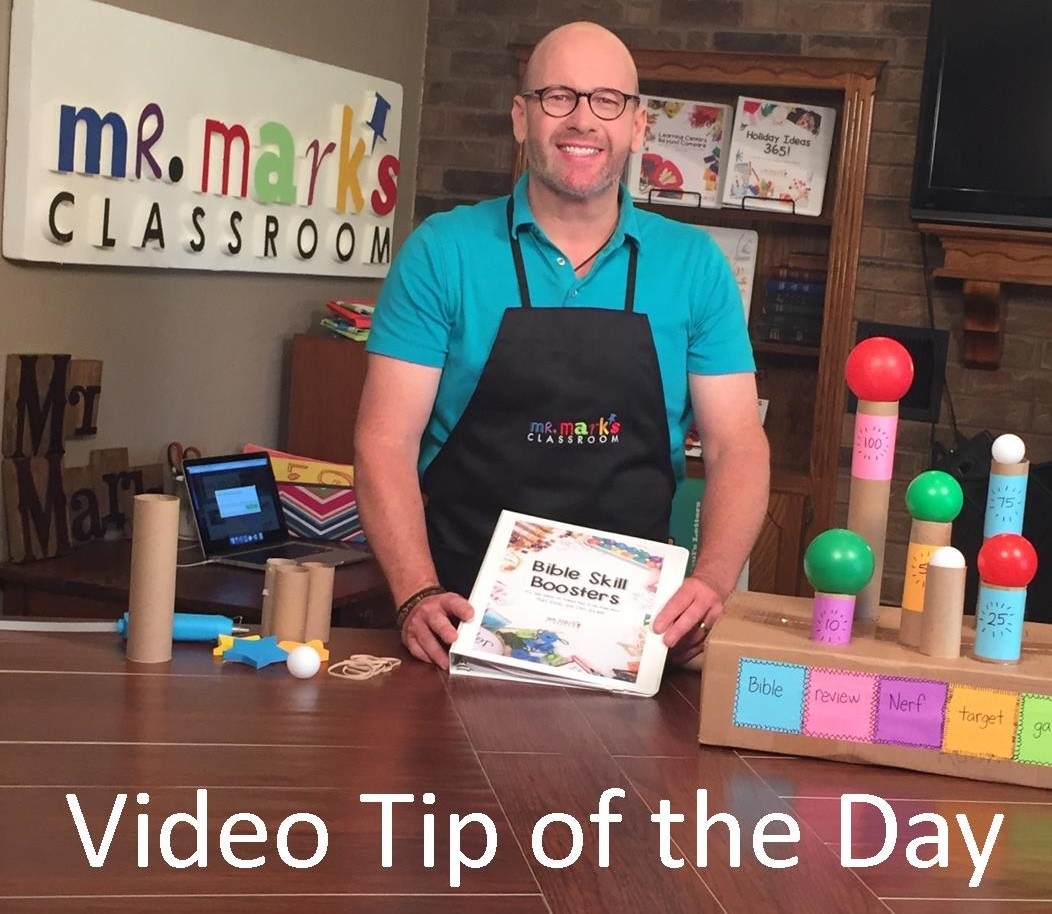Interview with Stephanie Chase, Children’s Minister of Champion Forest Baptist Church in Houston, Texas
All parents are not the same. They are very different and it’s our responsibility to recognize their differences. One of the best ways to be able to recognize the differences in parents, is to be able to recognize their personality types.
When you see a parent always make eye contact, smile and ask them, ‘How are you doing?’ Engage them in conversation, ‘How’s your family?’ and try to get them engaged in conversation.
I found that for me, a lot of times, if I am talking to a mother, that women like to talk about their families, and if I am talking to a father, men like to talk about their work.
Once you engage a parents in conversation, I always try to look for some of the basic personality characteristics, because once you know their personality type, then you can begin to recognize how to communicate better with them, so …
The basic four personality types are: first of all there’s sanguine and you can recognize this parent right off the bat. They’ll be very talkative. They’re story tellers, they’re animated and typically when you’re in ministry, or maybe you’re in a weekdays program, they’ll be the ones who engage you with lots of storying conversation and you may be at the door of the classroom forever hearing about their lives. Also that parent, something to remember is that they’re very forgetful, so if you ask them to volunteer for something, or to bring something to help out in your classroom, they might forget. Don’t go too hard on them if they do.
Another personality type that is easy to identify is the choleric. This is a parent who really likes to be in control, they’re very goal-oriented and sometimes they come off as a little bossy.
That’s just their personality type, so may show up at your classroom door and say something like, “Mark, in your classroom, I’ve noticed that you are not telling the Bible story in a certain way, you might want to try this way,” and your thinking, wow, okay, whatever, rude. They’re not trying to offensive; they’re just stating something that they see. They are typically to the point.
I found out that people, if I’m in any kind of discussion or debate, and maybe it is with a choleric. That if I just find what they are right about, in it. They may be right about the whole thing, but there’s something that they’re right about and say, “You’re right about this.” That’s exactly right, that you’re helping bring down the temperature of whatever the heated moment is because you’re creating a common ground, and so someone comes in and upset; I have found, find out what they are right about.
Another personality type, is the melancholy and this would be your perfectionist parent. They’re very analytical, they have high standards and they like things to be perfect. You can usually recognize a melancholy parent by the way they are dressed or their child is dressed. You know that little girl who comes into your class on Sunday with a perfect little dress and a matching socks and a matching bow. Her father or her mother is probably a melancholy perfectionist and they, she likes, or he likes, for them to be in order.
The last one is your pragmatic, and they’re your very peaceful, quiet, easy going parent. They don’t want to cause conflict, they just your easy going person, and they’re very pleasant to be around. They’re great for someone like me, because I tend to be a fast mover and they help keep me calm.
The more you get to know someone, the more you can identify some of these things. I like the way you said, a person who’s fun, a person who is needing control or in control, a person who is a perfectionist, and someone who is peace and quiet. Those are pretty easy things to kind of spot, but even to surface begin with, wouldn’t you say that, just realizing if they’re an extrovert or an introvert, so I know that I don’t come on too strong, or that I come on … that I don’t scare someone away, and at the same time battle someone in boldness. I think it’s nice to kind of have your radar on that.
If you’re an extrovert and you have a parent who comes to your classroom, and they’re quite or introvert, you can scare them away quickly. You have got to be really sensitive to that.
We have the Holy Spirit to discern and be wise in those situations and I’ve seen him give us great wisdom. This is the parenting personalities, there are personalities of every one that we see, but what about parenting styles. Are there differences?
I love to watch parents, parent, because it is so much fun. You’ll see for example, a helicopter type parent, who just is constantly hovering around their child, they’re expecting their child to be safe. The typhoon, really they operate out of a lot of fear so their greatest need is safety and security. When you begin to recognize, okay, is that a helicopter parent and you can recognize this kind of parent mark because a lot of times they hover at the door, and they walk, and they’ll stand on the playground and they’ll watch, or they’ll leave and go to worship service and come back in the middle just to check and make sure everything is okay.
I have a group that I took to camp, and this mother just followed our bus all the way to camp, and when we got there, we got all set, and I said ” Did you follow us? It is a two and a half hour drive.” She said, “Yeah I just needed to know everything was fine. If you need anything I’m glad to help.” I said, “No, we have our sponsors.” She said, “Yeah, I am not here to sponsor,” She made sure her daughter got all tucked in, everything situated. Then she came and told me, “I’m just going to go in town, and stay at the hotel, I’ll be back in the morning to make sure everything is okay.”
Over communicate to them, and explain to the how safety will be in place, make sure they know there will be one camp for every four children. Just reinforce those things with them.
The opposite of the helicopter parent is definitely your permissive parent. I’m actually picturing a permissive parent in my head right now and her comments are: Oh! He’s so precious, he’s so wonderful, look at him! And his climbing on all the furniture. This child seems to have no boundaries. The parent just wants the child to feel good, and be happy, and have fun.
We actually had this in a service not too long ago. The parent decided to take the child to service, and the child was actually crawling under the pew during the service, and finally once he got several, like four, five pews ahead some parent said something, and she of course said, “He’ll be fine, his fine.”
Think about that parent because they are going to need a little help in training, and recognizing that boundaries are important. You don’t want to bombard them with, “You should do this or that.” Just in little subtle ways, remain calm and give them some little parenting tips to help them understand the need for boundaries for their child.
Another type of parenting is the drill sergeant.
The drill sergeant, because I love to think of like a dad when he comes in his like,” Get in the class, take your coat off, get your Bible. Did you bring your Bible? Where is your Bible? Don’t write in your Bible. Now sit down and listen to your teacher, and do what she says.”
Drill sergeant’s goal is for their child to mind, you are going to follow the rules. They are just very controlling.
When you meet that parent at the door, you don’t want to be, “Oh! Hey how are you doing? We are going to have a great Sunday.” You want to be more specific and say, “We are so glad that Johnny is here today in the classroom, we are going to be learning about this type of story, and doing this activity, and I’m sure he will have a great morning.” So you keep those answers short, little emotion, matter of fact.
The last parent you see is the coach. That’s my favorite. Because children need training. They need to be shown. They need to be affirmed and encouraged. A coach really picks up the responsibility of helping children make their way, and understand what to do.
The coach will teach, and they’ll train, and help them understand. Then they let them go out, and play, and figure out life, when they fall down, when they get hurt. That coach is there to help figure out what happened and help that child to understand what went wrong, or how he could be better next time. He walks alongside him through life and coaches him for life.
That’s the goal.
It’s good to know where parents are in their relationship with God, because when you have those parents who are unbelievers and they don’t know the Lord. Then some of their conversations and what they are saying to you as the teacher, you may not hear things that you would normally hear in church. When you hear things being judgmental or critical, don’t be offended. Just begin to build a relationship with them. To help lead them to Christ.
We will often have to talk to parents when there’s a problem and an issue, and there’s somethings that I’ve learned have been so helpful to me, that I just love to be able to share with people.
When a parent comes to the door, or to you as a teacher, maybe they send you an email or call you, and they say something like, “This is what happened in your classroom during church and I don’t appreciate it…,” and they’re really upset. I just want to tell you what has worked for me and what the Lord has really taught me, is keep my mouth closed and be a good listener. Just listen.
Because a lot of times, when they get the opportunity, a lot of parent, just want to talk the whole thing out. It helps them just to process and sometimes it’s not as big of an issue as they made it in their mind, they come to that realization on their own.
That’s key in all of this and building these relationships. Communication is so valuable, you’ve got be a good communicator but really to be a listener. I think people want to be heard and when you repeat back to them any frustration they have or whatever’s going on, they can see that you’re engaged and being heard takes care of a lot of stuff. Sometimes we’re just so defensive, trying to defend ourselves or whatever and it’s not necessary, just go ahead and be a good listener. Sometimes I’ve seen some of the most difficult situation I was engaged in with a parent and we worked through it and they became some of my best friends, some of my best workers, because we had to walk through that together and suddenly we were on a team together and it was worth it.
Be able to just say to them, I am so sorry this happened. To be able to say sorry, not that your necessarily taking ownership. When we say, I am sorry, People just soften and they’re so much more receptive to have a conversation about the issue.
Remember, look at the person behind the behavior something is triggering this, so the listening, saying I’m sorry, because hurting people has a tendency of hurting people. Other than a pastor he was so funny, he would say, if you go and you help a dog out of a bear trap, he’s probably going to bite you, because all he knows is that he’s hurting and I’ve got to defend myself or others will hurt, and all the time you’re trying to help.

Podcast: Subscribe in iTunes | Play in new window | Download | Embed
Subscribe: Apple Podcasts | RSS





